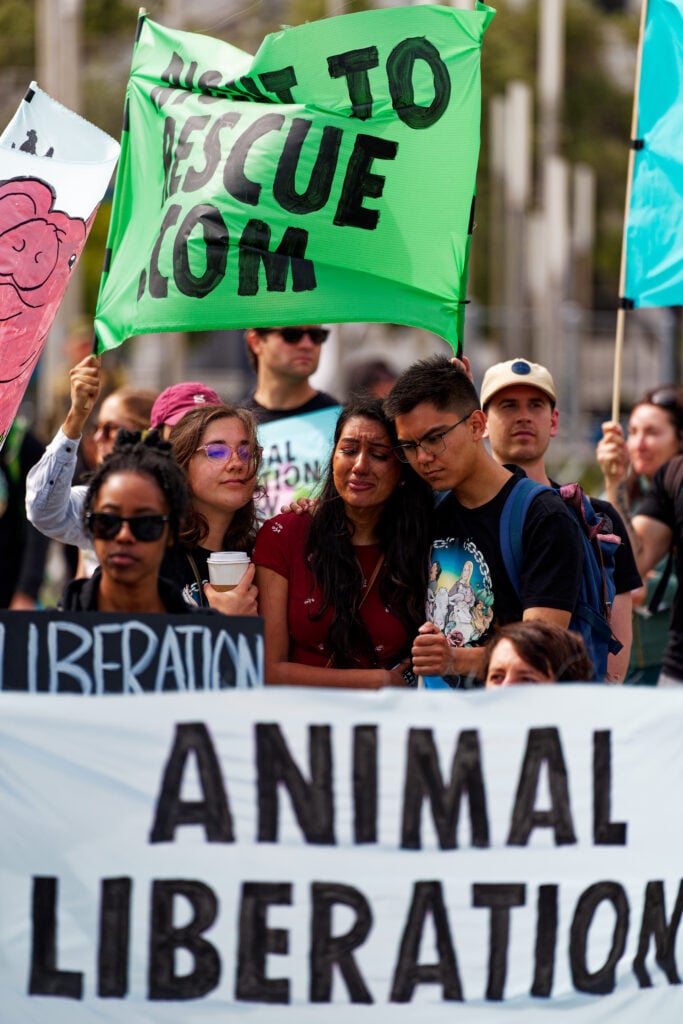As a pre-vet, my goal is to help animals live long, healthy lives. But I know that becoming a veterinarian is not enough. Not in a world where vast numbers of sick and vulnerable animals cannot be legally helped – because they are considered the “property” of a corporation that uses them for profit. In a world like this one, I have to be an activist. And that is why earlier this month, I walked out of a Petco in San Francisco carrying four mice, now named Amy, Mara, Simba, and Keri, in my arms. I didn’t pay for them. I rescued them.
Rescuing these four mice was absolutely worth the risk, because the animals possibly could have ended up hand-fed to somebody’s snake. Live-feeding has been widely condemned by veterinarians as inhumane both for the trapped and terrified mice and the snakes who risk being bitten. The mice sometimes wait hours or days in fear before they are eaten.
The problem with Petco

In public communications, Petco encourages customers to choose frozen mice to feed their snakes as the more “humane” option, but the company has been exposed for buying frozen mice from breeders that freeze the animals alive.
Moreover, contrary to its public advice, Petco continues to sell live “feeder” mice, too. When asked over the phone and in person if someone could buy live mice for their snake, multiple employees at this SF Petco told us yes. Petco doesn’t care if you buy a mouse to be your forever friend or to be eaten alive by one. That’s because to them, these animals exist to make money.
So do betta fish, like the one my friend Hulya carried alongside me during the rescue. Bred in overcrowded factories, many of them suffocate while being sorted while others get injured or sick from the travel and tiny bowls without filtration that they wait in at stores like Petco. But William, the male betta fish who my friend rescued, survived all of this. And now, he is receiving attentive care and will soon be adopted into a loving home. As animals’ allies and advocates, my friends and I at Direct Action Everywhere (DxE) are well-educated about the often misunderstood needs of betta fish and will ensure they go to homes where their unique needs are met.
Selling animals for profit is wrong
Even if Petco gave these animals plenty of space, enrichment, and medical care, it would still be wrong to buy and sell animals for profit. Animals, of any size or species, are not objects. You cannot put a price tag on their lives. They are individuals who feel fear, sadness, joy, and other emotions just like we do and they deserve respect.
Fortunately, these lucky few rescued mice and betta fish will be given medical attention, love, and care. But our goal is so much greater than these five individuals. What we want is a world where all animals have fundamental rights, as outlined in Rose’s Law, an animal bill of rights. The first of these rights is the right to rescue from situations of abuse and neglect.
The right to rescue is gaining momentum. San Francisco, Berkeley, and even Sebastopol, a city in Sonoma County, have all passed resolutions to support nonviolent activists currently facing trial for animal rescues in Sonoma County. The resolutions urge Sonoma County to drop the charges against the activists and instead investigate the criminal animal cruelty they exposed.
Last year, a jury in rural Utah acquitted two activists of felony charges for rescuing sick and dying piglets from a Smithfield factory farm. This was the first acquittal for open rescue in history, but already, it has happened again. In March, two women were acquitted in Merced for rescuing two diseased chickens from a Foster Farms slaughter truck. The Sonoma rescue trial is set to start September 8th, and DxE expects it to be the most publicized open rescue trial yet.
Right to rescue around the world

As support increases for the right to rescue, people are feeling emboldened to do open rescues around the world. The UK-based animal rights group, Animal Rising, recently rescued four sheep from land owned by King Charles.
Rescuing animals from situations of distress or exploitation should not be a crime, whether the animal is a dog overheating in a hot car or a sick chicken on a slaughter truck. It’s not just animal rights advocates who believe this. A columnist at The New York Times recently made this argument in an opinion piece titled, “Rescuing Farm Animals From Cruelty Should Be Legal.” And I believe rescuing animals from the cruel pet trade should be legal, too. The real crimes are committed by these multi-billion-dollar animal exploitation industries that torture animals, exploit workers, and degrade the environment.
I am becoming a veterinarian in order to help animals, and that is the same reason that I am going to continue engaging in open rescue.






